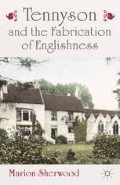Abstract
Critics and reviewers identified Tennyson as an English poet from the first reviews of his published poems. Early critics discerned in his work a ‘desire to imitate the old English lyrical poets’,1 hailed him as successor to ‘the great generation of poets which is now passing away’,2 and considered the poet’s influence on ‘national feelings and character’.3 A kindly review of Poems by Two Brothers (1827) welcomed ‘a graceful addition to our domestic poetry’.4 In this study I examine Tennyson’s ‘domestic poetry’ — his portrayals of English nature and landscape, the monarchy, medievalism and the ‘English Empire’,5 written throughout his career and in their changing nineteenth-century context — to consider whether Tennyson’s representations of England and the English were idealized portrayals, hence fabrications, and to consider whether and in what ways his representations reflected, shaped or subverted, established or emerging ideas of Englishness in the nineteenth century.
Access this chapter
Tax calculation will be finalised at checkout
Purchases are for personal use only
Preview
Unable to display preview. Download preview PDF.
Notes
[William Johnson Fox], ‘Poems, Chiefly Lyrical’, Westminster Review, 14 (1831), 210–24
T.S. Eliot, ‘In Memoriam’, Essays Ancient and Modern (London: Faber and Faber, 1936), pp. 175–90
Richard A. Sylvia, ‘Reading Tennyson’s Ballads and Other Poems in Context’, Journal of the Midwest Modern Language Association, 23 (1990), 27–44
Tennyson Among the Poets, ed. Robert Douglas-Fairhurst and Seamus Perry (Oxford: Oxford University Press, 2009)
John Batchelor, Tennyson: To Strive, To Seek, To Find (London: Chatto & Windus, 2012.)
Simon Jenkins, A Short History of England (London: Profile, 2011)
Peter Ackroyd, The History of England: Volume 1, Foundation (London: Macmillan, 2011)
Jeremy Paxman, Empire: What Ruling the World Did to the British (London: Viking, 2011)
Roy Strong, Visions of England (London: Bodley Head, 2011).
Edward W. Said, Orientalism: Western Conceptions of the Orient, 4th edn (London: Penguin, 1995), p. 13.
Hallam Tennyson, Alfred Lord Tennyson: A Memoir, By His Son, 2 vols (London: Macmillan, 1897), II, p. 127.
In an unsigned review of Poems (1842) John Sterling described Tennyson as ‘the most genial poet of English rural life that we know’, Quarterly Review, 70 (1842), 385–416
Reviewing Idylls of the King in October 1859, Gladstone commented: ‘Lofty examples in comprehensive forms is, without doubt, one of the great standing needs of our race’, [W.E. Gladstone], ‘Idylls of the King [1859] and Earlier Works’, Quarterly Review, 106 (1859), 454–85
Richard Chenevix Trench, On the Study of Words, 2nd edn (London: Parker, 1852)
Edward Bulwer-Lytton, England and the English, 2nd edn, 2 vols (London: Bentley, 1833).
[Nassau Senior], ‘France, America, and Britain’, Edinburgh Review, 75 (1842), 1–48
Washington Irving, The Sketch Book of Geoffrey Crayon, Gent. (New York: Heritage, 1939).
Ralph Waldo Emerson, English Traits (London: Routledge, 1856)
Sarah Stickney Ellis, The Women of England: Their Social Duties, and Domestic Habits (London: Fisher, 1839), p. 10.
Walter Bagehot, The English Constitution, ed. Miles Taylor (New York: Oxford University Press, 2001), p. 35.
Norman Davies, The Isles: A History, 2nd edn (Basingstoke: Macmillan — now Palgrave Macmillan, 2000), p. 863.
Peter Mandler, The English National Character: The History of an Idea from Edmund Burke to Tony Blair (London: Yale University Press, 2006), p. 4.
Robert Colls, Identity of England (Oxford: Oxford University Press, 2002), p. 8.
Krishan Kumar, The Making of English National Identity (Cambridge: Cambridge University Press, 2003), pp. x–xi.
Catherine Hall, ‘The Rule of Difference: Gender, Class and Empire in the Making of the 1832 Reform Act’, in Gendered Nations: Nationalisms and Gender Order in the Long Nineteenth Century, ed. Ida Blom, Karen Hagemann and Catherine Hall (Oxford: Berg, 2000), pp. 107–35
The phrase ‘Victoria, Queen of England’ recurs in the refrain of the street ballad ‘Queen Victoria’, reproduced in John Lucas, ‘Love of England: The Victorians and Patriotism’, Browning Society Notes, 17 (1987–88), 63–76
Richard Williams, The Contentious Crown: Public Discussion of the British Monarchy in the Reign of Queen Victoria (Aldershot: Ashgate, 1997).
Spectator, 4 June 1842, cited in Edgar R Shannon, Jr, Tennyson and the Reviewers (Cambridge, MA: Harvard University Press, 1952), p. 60.
Francis Palgrave cited in Hallam Tennyson, Alfred Lord Tennyson: A Memoir, By His Son (London: Macmillan, 1899), p. 837.
Copyright information
© 2013 Marion Sherwood
About this chapter
Cite this chapter
Sherwood, M. (2013). Introduction: The Enigma of Englishness. In: Tennyson and the Fabrication of Englishness. Palgrave Macmillan, London. https://doi.org/10.1057/9781137288905_1
Download citation
DOI: https://doi.org/10.1057/9781137288905_1
Publisher Name: Palgrave Macmillan, London
Print ISBN: 978-1-349-44999-6
Online ISBN: 978-1-137-28890-5
eBook Packages: Palgrave Literature CollectionLiterature, Cultural and Media Studies (R0)

